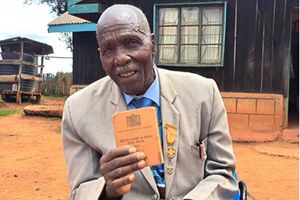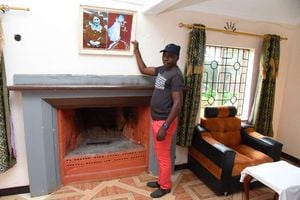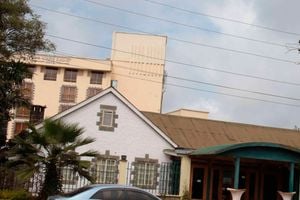
Dr Keith Rigathi, the proprietor of the Treetops Hotel in Nyeri, inspects the progress of the renovation.
After remaining shut for three years due to the Covid-19 pandemic, the Iconic Treetops and Outspan hotels are set to reopen in May,, charting a new era for the hospitality sector, under the proprietorship of Deputy President (DP) Rigathi Gachagua’s son.
This time, the Treetops Hotel, famed for witnessing the ascension of Queen Elizabeth to the throne 72 years ago, will not only be marketed for its British heritage but also as a significant relic of the Mau Mau movement in Nyeri.
Treetops earned global recognition as the hotel where Elizabeth II went to bed as a princess and woke up as a queen following the death of King George VI.
It was when she was having dinner at the hotel, which was built on top of a fig (Mugumo) tree, that news of the king's demise reached her- marking the beginning of her reign.
She climbed the rickety ladder to Treetops as a princess on February 5, 1952, and descended the following day as a queen.
The queen visited the hotel three times- in 1952, 1959 and 1983. This saw the hotel management name one of the suites after her.

Queen Elizabeth II and Prince Philip (second left) at the site of the old Treetops Hotel in November 1983.
Two years after her first visit, on May 27, 1954, Mau Mau fighters burned down the hotel which had been constructed by a colonial farmer, Captain Bill Sheldrick.
Captain Sheldrick had felt that the fig tree- which the hotel was built on, provided a good view for observing animals watering in a nearby water hole.
The hotel would later be reconstructed about 100 metres from the old one, by Eric Sherbrooke, the founder of its sister establishment- the Outspan Hotel. The site where the queen's treetop was situated is now enclosed by an electric fence and a fig tree.
According to Dr Keith Rigathi, the new hotel owner and son of DP Gachagua, the establishment holds a significant part of Kenya’s history on its liberation struggle that has remained untold.
“For instance, very few people know that beneath the hotel lie underground tunnels constructed by the Mau Mau fighters for accessing the facility,” he explains.
Located roughly 10 kilometers from the hotel which is within the Aberdare Forest, stands a fig tree that served as a post office for the Mau Mau movement.
The fighters would communicate by writing messages and leaving them within the tree. These messages were often inscribed on leaves using charcoal or blood.
the DP on April 4 at the 4th graduation ceremony of the Nyeri National Polytechnic, hinted at the absorption of the hotels.
“Our hotels here have died. We have met with businessmen and we have a plan. We have bought Treetops and Outspan hotels. Renovations are going on day and night and these hotels which have not been operational for years will soon be reopened so that visitors can have a place to stay and that we can boost business for Nyeri people,” said the DP.
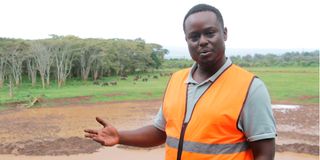
Dr Keith Rigathi, the proprietor of the Treetops Hotel in Nyeri.
He said that the decision to buy the two historic hotels, stemmed from a challenge that he had shared with the local business people.
“They agreed to join me in reviving this sector because we were facing such great shame as people from this great county,” Mr Gachagua said.
Furthermore, he noted that the reopening of the two hotels would provide an opportunity for hospitality graduates to apply their skills in a real-world setting.
Besides Treetops and Outspan, the Green Hills hotel which was opened in the 1970s and is associated with the Late President Mwai Kibaki, has also remained closed.
Before its closure, Green Hills built its reputation by becoming one of the landmark hotels in Nyeri, especially for visitors hoping to stay within town.

Treetops Hotel in Nyeri.
The hotel was famed for its family-friendly environment, conference facilities that attracted people carrying out meetings or in-house events in town. It also offered team building activities for company groups spending at the hotel.
In an exclusive interview, Dr Rigathi says that the revamp of the hotel is not meant to eliminate its British history.
“It is important to note that we are not distancing ourselves from British heritage. Treetops is a historical site and that richness must be preserved for all. We simply feel that there are many untold stories surrounding the property that would be of great interest to many Kenyans. It is those stories we intend to tell,” he says.
Dr Rigathi further explains that the decision to promote the hotel as a local historical site, alongside its international significance, has also been driven by the necessity to adapt to the evolving hospitality sector.
“The biggest takeaway from the Covid-19 pandemic and its impact on the hospitality industry was the importance of valuing local tourists as equally as international visitors. Local tourists played a crucial role in sustaining the sector when international flights were unavailable,” Dr Rigathi says.
The hotel, located in the Aberdare forest, is unique for its exquisite view of wild animals that troop to the lounge to drink water and lick soil laced with minerals.
It is also known for its excursions which include birdwatching, game drives, and visits to waterfalls in the forest, among them Karura and the Mau Mau post office.. It boasts one of the largest bird migratory corridors in Nyeri County, alongside Wanjee Park in Mukurweini.
To encourage domestic tourism, the hotel management is currently developing customized, budget-friendly packages for locals. The hotel owner says that the rates will be determined by the prevailing market conditions.
The hotelier has started renovations aimed at modernizing the hotel and expanding it to have diverse accommodation facilities for guests, especially those who enjoy outdoor activities.
“This means that visitors interested in staying at the hotel will have more than just suites at the lounge, they will have a variety of options including tented camps and cottages,” says the proprietor
Contrary to before, Treetops will now allow walk-ins, by customising activities and meal packages for visitors who don’t wish to spend at the hotel.
According to Mathenge Wa Iregi, a former Mau Mau fighter, marketing Treetops hotel's local history is a good move towards preserving it as a memorial site for the Mau Mau movement.
He says that after its reopening, the relevant local government agencies should intervene to document the hotel as a local historical site, ensuring its continued significance.
The freedom fighter says that he wouldn’t mind visiting the hotel to explore its historical significance.
"I would especially like to understand the lifestyle of the colonial settlers at the establishment," he says.
Wa Iregi says Mau Mau fighters burnt the hotel because they were angered by colonial settlers constructing it in their forest.
"This is why the troop that burnt down the hotel only destroyed the building and nearby trees; no one was harmed in the fire," he says.
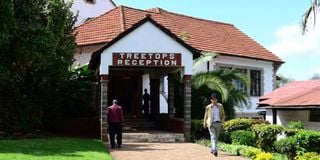
The Treetops Hotel in Nyeri.
However, Anthony Maina, a curator of the National Museums of Kenya, says that there is a possibility that the freedom fighters razed the establishment to avenge the killing of their battalion.
As the Treetops Hotel showcases its Kenyan and British history, the Outspan Hotel situated on the outskirts of Nyeri town, will extend its services to include conference facilities and serve as a destination for family vacations.
The Hotel was home to the founder of the Scout Movement, Lord Baden Powell, from 1938 to 1941. It is unique for its colonial architecture, with an old-fashioned look on display even in its rooms. But it is the Paxtu Museum that places it in history books.
Paxtu is the cottage where Lord Baden- Powell lived until his death. Today, it is one of the most iconic destinations for the global scouting movement.
The collections include Lord- Powell’s original paintings, writings, photos, and scouting relics.
Besides his artistic works, the walls of the museum are adorned with flags from different parts of the world, either left by visiting scouts or sent by visitors once they arrived back in their country.
According to the new hotel owner, reviving the business will play a part in supporting the restoration of the Scout Movement.
“We are currently in talks with local scout officials and they have proposed some promising ideas for reviving the movement, although we both agree that a bit more effort is needed to revitalize it,” explains Dr Rigathi.
The hotels’ new strategies to expand into the local tourism market present a new dawn for establishments that were highly dominated by foreigners.
Previously, visitors who wanted to stay at the Treetops Hotel were required to book their accommodation online before being permitted to enter the premises.
According to Mr Christopher Atheka, a former employee of the hotel, once visitors made their booking, they would then be collected from the airport by either hotel agents or tour companies.
“The procedure involved taking them to Outspan for lunch, followed by an evening game drive at Treetops and later dinner,” explained Mr Atheka.
Such visitors would later move to their next destination which was along the Mt Kenya Tourism Circuit. The tourism circuit consisted of hotels and lodges around the mountain.
From the scenic Mt Kenya routes in Meru to the chimpanzee sanctuaries in Laikipia and Mau Mau caves in Nyeri, tourists exploring the circuit were treated to a diverse range of experiences including hikes, game drives, visits to historical sites, encounters with natural landmarks, culinary experiences, farm tours and scenic road trips.
“One was only required to book online once and all hotels along the circuit would get instant information and the scheduled dates to expect according to your itinerary,” says Mr Atheka.
Treetops partly drew many British, Chinese, Spanish and American tourists while the Outspan attracted scouts from all parts of the world.
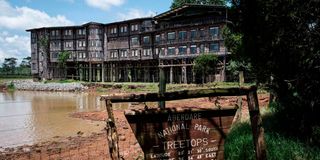
In this file photo taken on April 10, 2021, a wooden board shows the name of Treetops Lodge where Britain's Queen Elizabeth II of England stayed the night her father, the King, died and became Queen in 1952, in Aberdare National Park in Nyeri County.
Mr Atheka says that the reopening of the two establishments, which were previously managed by the Aberdare Safari Hotels, will help in revamping the Mt Kenya Tourism Circuit.
However, according to the Kenya Association of Hotelkeepers and Caterers Mt Kenya region chairperson Edward Wangechi, more needs to be done.
He says that there is a need for the counties’ tourism departments to form a caucus with stakeholders and come up with a regional strategy that encompasses the Mt Kenya Region.
“The national and county governments ought to also review the taxation regime for the industry to cushion the rising costs of doing business,” he says.
According to Mr Wangechi, there is a huge opportunity in the region due to its diverse offerings in tourism products which include adventure, culture, wildlife, agro-tourism, romance, fun, and family getaways.
The Outspan and Treetops Hotels, will be the second and third historical hotels in the region to resume operations post Covid-19 pandemic. The hotels are set to be re-opened at the end of May.
This follows the reopening of the iconic Nanyuki-based Fairmont Mount Kenya Safari Club to the public last July after a two-year closure.


